STRONG Kids Project Gives Undergrads a Research Opportunity in Children's Health
May 28, 2015
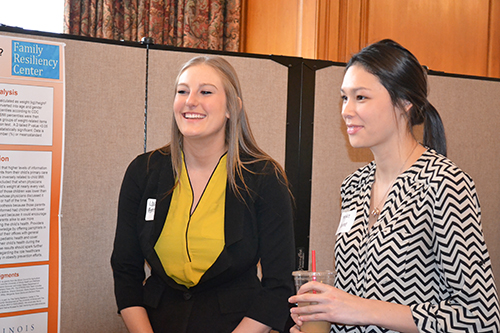
During the Undergraduate Research Symposium in April 2015, Lauren Amendola (left) and Megan Devine (right) present their research about childhood obesity to a visitor to the symposium.
We constantly hear about the results of some well-known researcher's important study, and their findings often impact our lives and our choices. But over the last year, undergraduate students across a number of Illinois colleges and disciplines collaborated to perform important research themselves. As part of the Family Resiliency Center’s STRONG Kids program, students enrolled in an undergraduate research course, HDFS 494, conducted interdisciplinary research related to children’s health and obesity. Then, during the Undergraduate Research Symposium at the end of the Spring 2015 semester, they actually presented their research to the public.
What benefit is undergraduate research? According to Jen Themanson, Program Coordinator for STRONG (Synergistic Theory and Research on Obesity and Nutrition Group) Kids: “Many of the students are interested in professions where they will be working in a healthcare setting or working to better the lives of individuals. So, research, especially an applied experience like this where they see the front end and the back end of research, gives them the opportunity to make really strong connections and become strong professionals. They are involved in everything from simple data entry to actually going out and working with our families.”
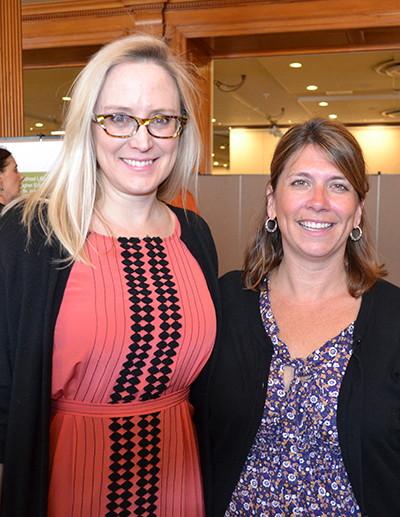
Left to right: Brenda Koester, Assistant Director of the Family Resiliency Center, and Jen Themanson, Program Coordinator for STRONG Kids.
Brenda Koester, Assistant Director of the Family Resiliency Center, indicates that in addition to STRONG Kids, students could choose from a number of the Center’s other programs devoted to children’s health. For example, Sprouts is “a healthy habits curriculum for pre-k and kindergarten students. It teaches young kids things from healthy choices, to where food comes from, to healthy sleep habits, to energy balance.”
Also a part of the STRONG Kids program is Strong Kids 2, funded by a grant from the Dairy Research Institute, which she describes as “A prospective birth study where we are recruiting 400 moms in the local area. One of the aims is to see how breast feeding early into solids foods, etc, help predict children’s eating habits down the road.”
Students who participated in the course appreciated the chance to learn about and actually conduct research themselves; for many, the subject matter they studied was closely related to their future career.
For example, Lauren Amendola, a junior in Human Nutrition who intends to go on to medical school, called participating in the Strong Kids Project “so beneficial,” and said the experience had “just been eye-opening to how much work goes into each research project.”
STRONG kids was Amendola’s first time doing research, and she appreciated getting to put into practice what she had learned about research: “Throughout classes, you learn the scientific method and you learn about research,” adds Amendola, “but until you are in the field and interacting with participants and entering data and even writing out literature reviews, which we did, creating a research project and presenting like we’re doing right now, I don’t think that you really understand everything that goes into a study or a research project.”
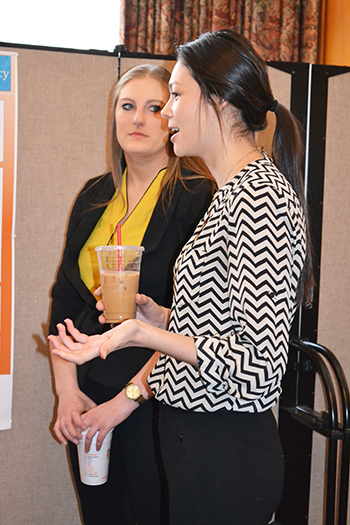
Megan Devine (right) explains their research about childhood obesity to a Research Symposium visitor.
Amendola’s research partner, Megan Devine, a junior in Chemistry who also intends to go to medical school, possibly anesthesiology, appreciated working with the different projects at the Family Resiliency Center. She and Amendola were involved in Strong Kids 2; had access to Strong Kids 1 data for their poster; were involved with Sprouts, a study that works with elementary students about what they think are healthy foods; as well as Project Dine. “There have been a lot of different options, and a lot of freedom in what we get to do...They’re very encouraging there at the Family Resiliency Center, so I’ve loved this opportunity, every minute of it.”
Devine felt that their study, “Childhood Obesity: Can Healthcare Providers Aid Parents in Prevention?” could be of benefit in addressing the problem.
“But I do think that if this information were presented to parents, and knowing how influential providers are on parents, I think that it would definitely influence how physicians, nurses, and anyone who interacts with families choose to display the information to the families…Children are essentially the future of America, so we do want to keep them as healthy as possible, and obesity is a risk factor for so many different conditions later on in life, like diabetes, cancer, any number of ailments. So I think that this is a very important topic to be looking into.”
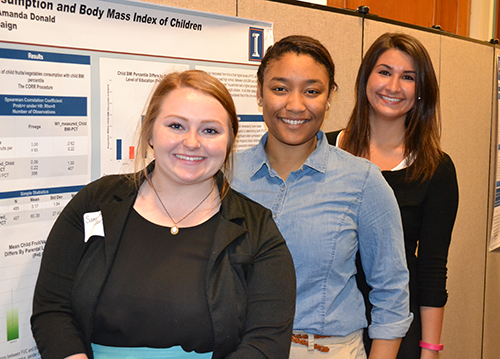
Left to right: Samantha Addante, Amanda Donald, and Mary Miles by their poster on “Fruit and Vegetable Consumption and Body Mass Index of Children" at the 2015 Undergraduate Research Symposium.
For Amanda Donald, a senior in LAS’s Molecular and Cellular Biology Department, STRONG Kids wasn’t her first research experience. However, she says this project, “Fruit and Vegetable Consumption and Body Mass Index of Children,” allowed her to move into a more clinical kind of role. Donald says she definitely sees research in her future: “Yes, I am a scientist at heart. That’s what my degree is in. My research will probably focus a lot more on people…just because I am looking at being a physician. So, I like this kind of research; this is definitely a stepping stone for me.”
Also involved with the fruit project, Samantha Addante, a sophomore in Human Development and Family Studies hopes to go into clinical psychology addressing issues that directly relate to children, such as depression. “Research definitely is for me,” reports Addante, who says the project helped her develop her people skills: “Beyond the research process of analyzing data and all that, I actually learned to interact with parents on a better basis. We had to go into different home visits a lot and work closely with the parents and their child. So, Strong Kids taught me how to have better relationships, develop them more quickly, and then take that data back to the lab to analyze.”
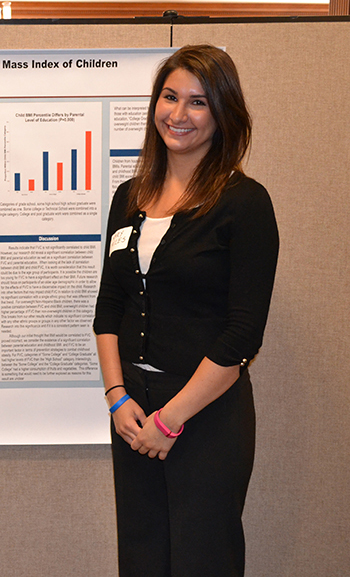
Miles Mary, a senior in Interdisciplinary Health Sciences.
Unlike her colleagues, Mary Miles, the third partner on the project and a senior in Interdisciplinary Health Sciences in the College of Applied Health Sciences (AHS), intends to go to law school, specializing in health law. Miles hopes to eventually “formulate policies to target some of these issues like childhood obesity.” Miles believes this experience will be helpful down the road: “So, I think this will definitely help me understand what I need to look for with research, and how I can interpret it and use the results to really formulate some helpful policies in the future.”
According to Miles, the take-away from their study was that not just kids, but their parents, need to be educated about healthy foods: “People need more education—not just necessarily about health—but about everything, and then they can really utilize that information. And you can see it—it’s not just at the base level of children learning fruits and vegetables, that idea needs to start somewhere else, with their parents. So that they can have that information, and its importance, and feed them that healthy food.”
Alaina Ceron, a junior in Sociology in Liberal Arts and Sciences (LAS) hopes for a career in health education, specifically educating minorities in Chicago about medical care and getting them into healthcare. Ceron says her research, “TV Time and Sugary Drinks: How They’re Making Your Child Obese,” reinforced her career choice and the need to educate parents about the correlation between watching tv, soft drinks, and obesity: “Look, the more TV time your child has, the more likely they are to intake sugary beverages…the research we found concluded that. So, to be able to get that education and promotion out to parents.”
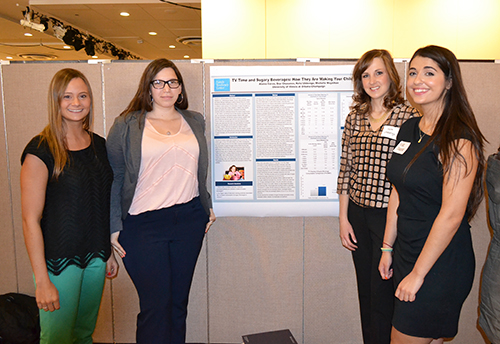
Left to right: Michelle Moynihan, a senior in Speech and Hearing Science; Alaina Ceron, a junior in Sociology; Kelsi Ubbenga, a senior in Speech and Hearing Science; and Dior Chasanov, a junior in Interdisciplinary Health Sciences by their research poster, “TV Time and Sugary Drinks: How They’re Making Your Child Obese” at the 2015 Undergraduate Research Symposium.
Calling the project “definitely beneficial,” Ceron claims, “It has made me a better student in terms of how to properly conduct a research project, how to properly present a research project.”
Ceron’s teammate, Kelsi Ubbenga, a senior in AHS‘s Speech and Hearing Science, hopes to eventually work in a school setting with children. Ubbenga felt the interdisciplinary aspect of the program was a plus: “We’ve talked a lot about the importance of having a team of all different disciplines working together to find how to help the issue. I think that’s really important. It’s made me really aware of how everyone can bring something to the table. That’s why I think this class is really neat; it brought all different disciplines to the table.”
Michelle Moynihan, also a senior in Speech and Hearing Science, hopes to work with children in an early childhood setting. Moynihan indicates that STRONG Kids gave her “a wider perspective of what I can do in my field, and different ways to help kids that I’m going to be working with, and different things to be aware of—things I’m going to see every day.”
The fourth member of their team, Dior Chasanov, a junior in Interdisciplinary Health Sciences in AHS,
Indicates that she learned she learned professionalism under less-than-ideal situations: “We went to homes…and you didn’t know the people…so you really learned how to be professional and how to deal when things go wrong. Because kids will just start screaming and crying, and you’ve just got to deal with it. That was really useful to me, because it taught me how to act under pressure.”
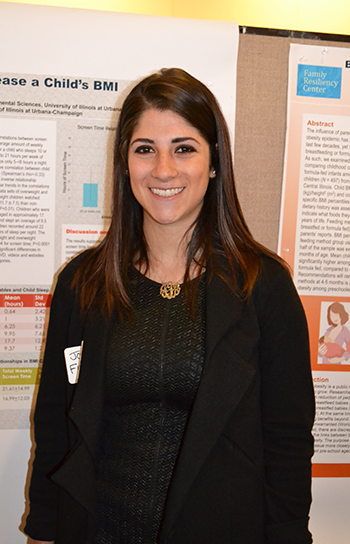
Jordyn Fishman, a senior in Human Development and Family Studies
Jordyn Fishman, a senior in ACES’ Human Development and Family Studies, whose career goal is to work for a nonprofit organization, says she got involved with STRONG Kids because: “I also am very passionate about working with kids and families, which is why I’ve been working with this program.”
Fishman says the results of their study, “Technology's Impact on Sleep and Body Mass Index,” showed that “There is a correlation between screen time and sleep and how important sleep is for our wellbeing. I’ve always known that, but to find that significant of a correlation was very interesting.” Fishman says the project also confirmed her choice of career: “It’s very important for me to go out and advocate for this and be someone who can go and teach other people that involvement with your child is crucial.”
Fishman reports that she also gained new insights about research: “Personally, this was very eye-opening to see the back end of how things work, how we find new studies, how we discover findings in our world. This was very interesting for me to see how that works behind the scenes.”
Plus, she appreciated the interdisciplinary aspect of the program: “One part of this program that really impacted me was working with peers from other disciplines. They have pre-med majors, pre-law majors, health, anything across the spectrum. That was one of the most impactful parts of this; being around like minded individuals who have such different interests. It was very cool."
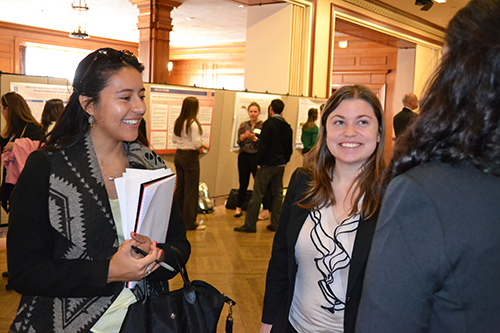
Left to right: I-STEM researcher Sarai Coba and Natasha Joy (center) chat with Marija Maretic about their study regarding breastfeeding vs. formula to prevent obesity..
Marija Maretic, a senior in Interdisciplinary Health Sciences (AHS), who hopes to be a physician’s assistant, and Natasha Joy, a senior in Communication (LAS), who wants a career in human resources, were part of STRONG Kids 2 and researched “Breastfeeding vs Formula Feeding: The Role of Breastfeeding in Preventing Childhood Obesity.”
Joy says this was her first time doing research and reports gaining skills in several areas: “I was able to learn how to communicate with different people. Working with professors, working with Dr. Musad, working with different families, you learn problem-solving skills, learn how to work with data. So, you learn life skills and different academic skills.”
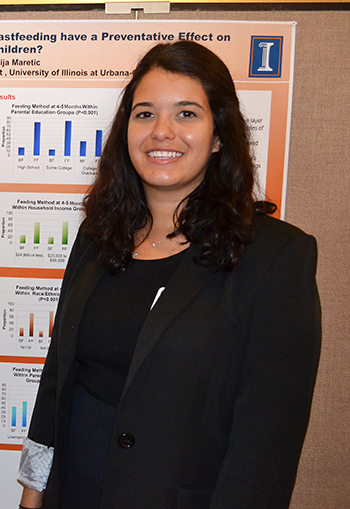
Marija Maretic, a senior in Interdisciplinary Health Sciences.
Maretic appreciated the research process from start to finish: “For me, it was interesting to see what we implemented in the community come to life in a paper that was researched and studied. So, it was really important for me to learn how to write and analyze this data and how to be able to explain it to people in the future and just how it all correlates together, and how these studies are important; it was nice to see how what we did affects health…So, I really enjoyed doing that. And I really enjoyed the experience of learning how to write something like this and being able to present it. I think that’s something that will be very important in our futures, presenting something like this on a professional scale.”
Emily Rohman, a sophomore in Community Health in AHS, says she may possibly want to go into research or medicine, but definitely wants to be involved in community outreach, which was one reason she found the STRONG Kids project so significant: “Being involved with the research with the Family Resiliency Center has been one of the highlights of my college career so far, because I’ve been able to be involved with outreach in the community.”
Rohman also appreciated the networking: “This research experience has also helped me to network, to apply what I have learned inside the classroom to a broader aspect. At the Illinois Action for Children conference we got to see how our research applied in a public policy aspect. Also, working with other students from other disciplines was very significant.”
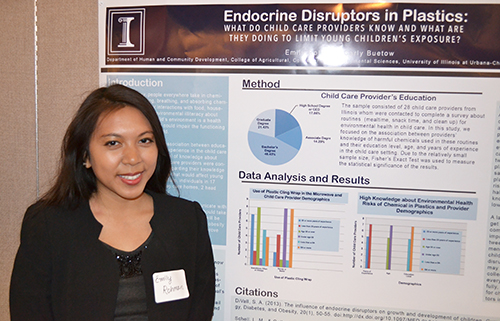
Emily Rohman, a sophomore in Community Health in AHS, by her poster on Endocrine Disruptors in Plastics.
What did she learn from her study, "Endocrine Disruptors in Plastics: What do Child Care Providers Know and What are They Doing to Limit Young Children's Exposure?” that might be helpful to the general public? “Some healthcare providers do not know that plastics can be a danger. Environmental health is beyond just what you think, it is everyday interactions that impact children’s developing lungs and systems.”
Michael White, a junior in Molecular and Cellular Biology in LAS studied: “Correlation Between Body Weight and Polymorphisms in AHSG in Children.” While White's short-term career goal is to become a physician, his long-term goal is to make a difference: “Whatever field of medicine I go into, I would like to make it better for whatever people come in, so to have a major breakthrough with something or some technique, etc.”
White believes he benefitted personally from the chance to do research: “I’ve been wanting to get into research for a while, because if I want to make a difference, I should know how to do research to see what I can do or what needs to change. I’ve actually learned in class that the best researchers ask the best questions. By asking the right questions and answering them the right way, that’s how real progress is made about insight to certain things.
Established in 2006, the Family Resiliency Center is a unit in the Department of Human and Community Development within the College of Agricultural, Consumer and Environmental Sciences (ACES). The Center works to advance knowledge and practices via research, outreach, and education to strengthen families’ abilities to meet life’s challenges and thrive. Center activities are related to the following four themes:
- Child and Family Health and Wellbeing
- Child Care as a Resource
- Immigrant Families and their Children
- Positive Child and Youth Development
More: Undergraduate Research Symposium, 2015
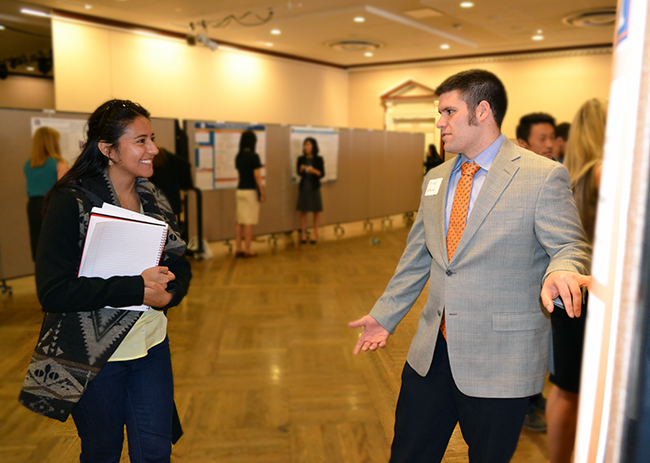
Michael White (right) presents his research to I-STEM researcher Sarai Coba (left) during the symposium.













.jpg)
















